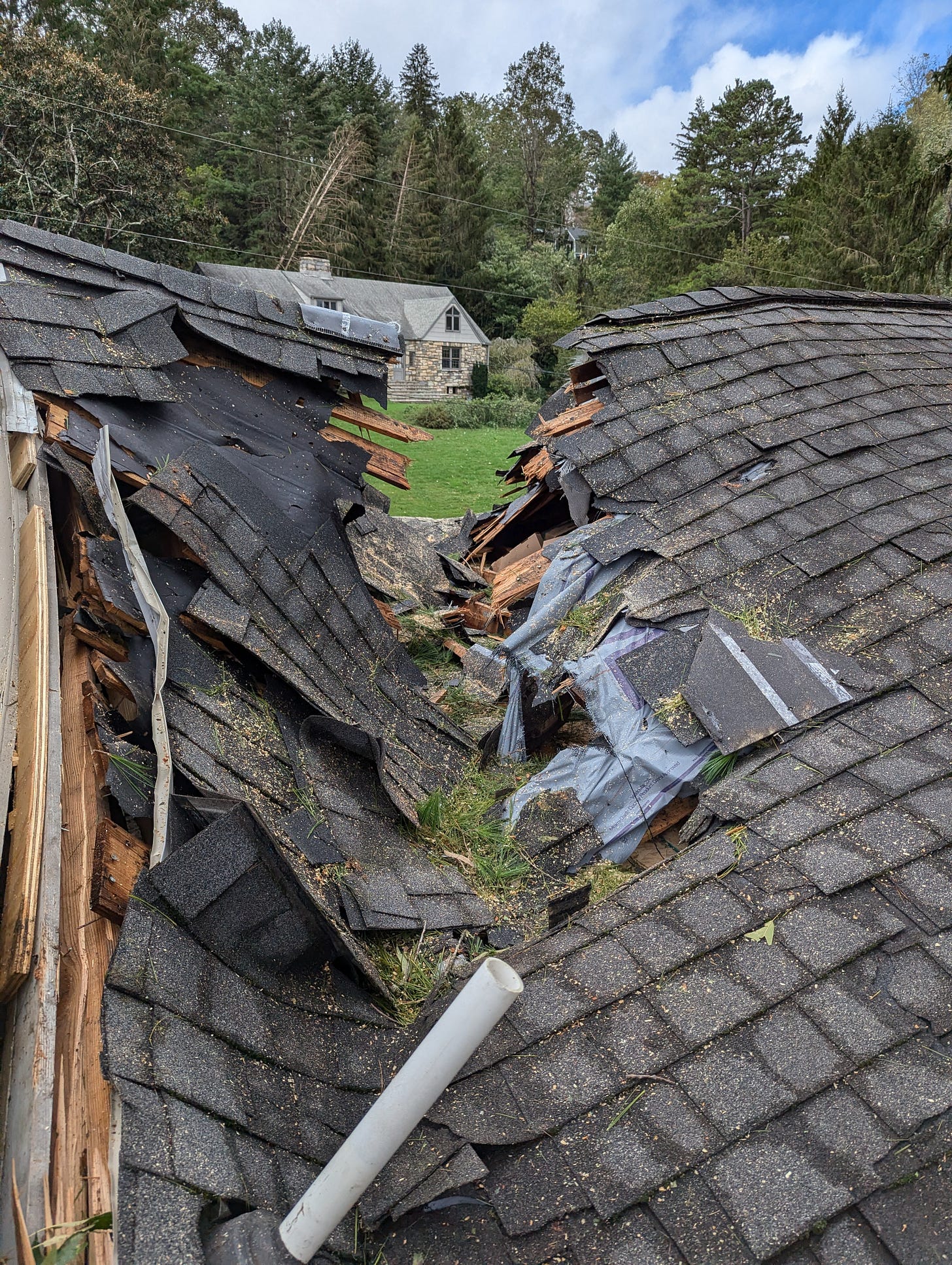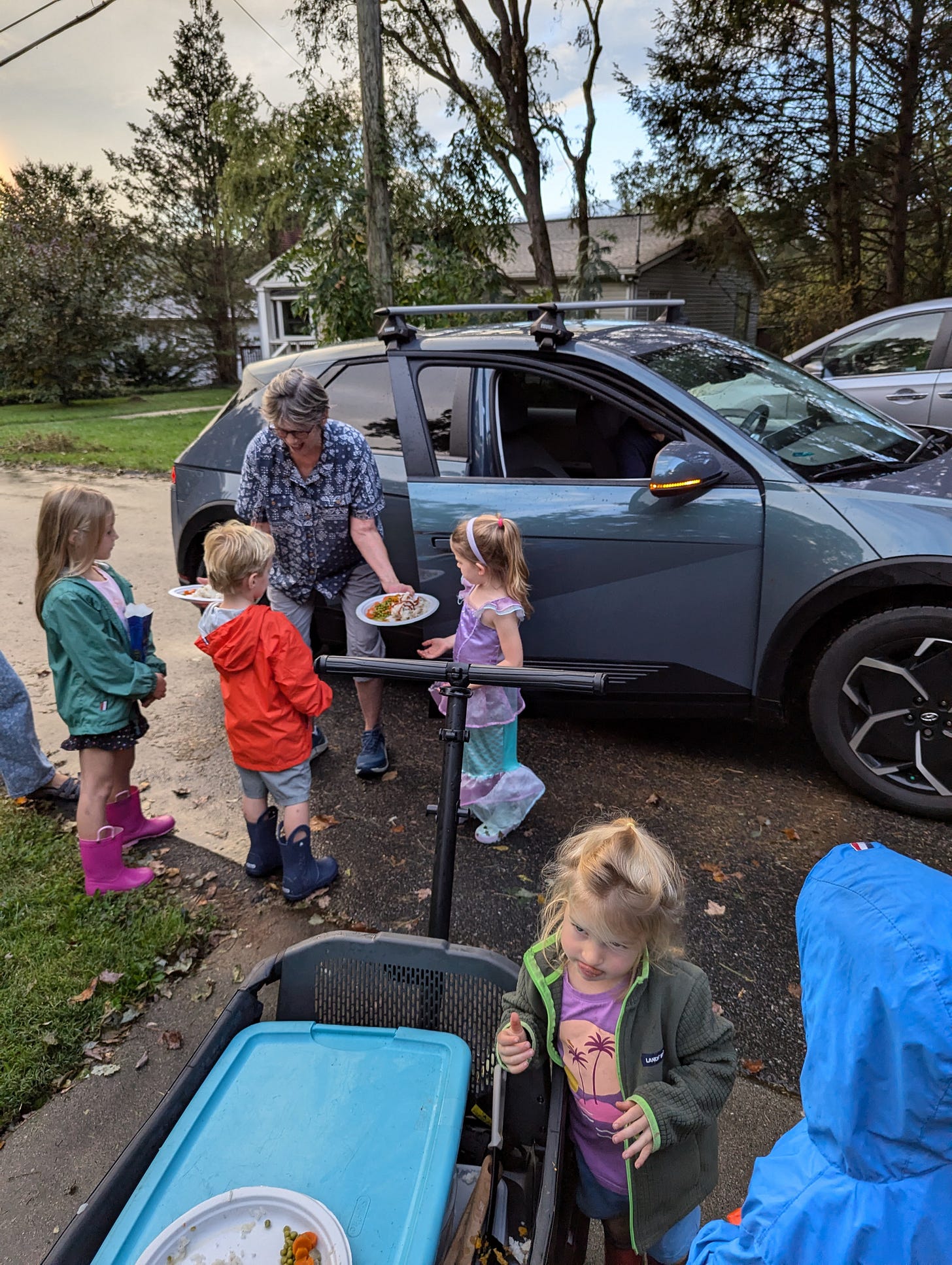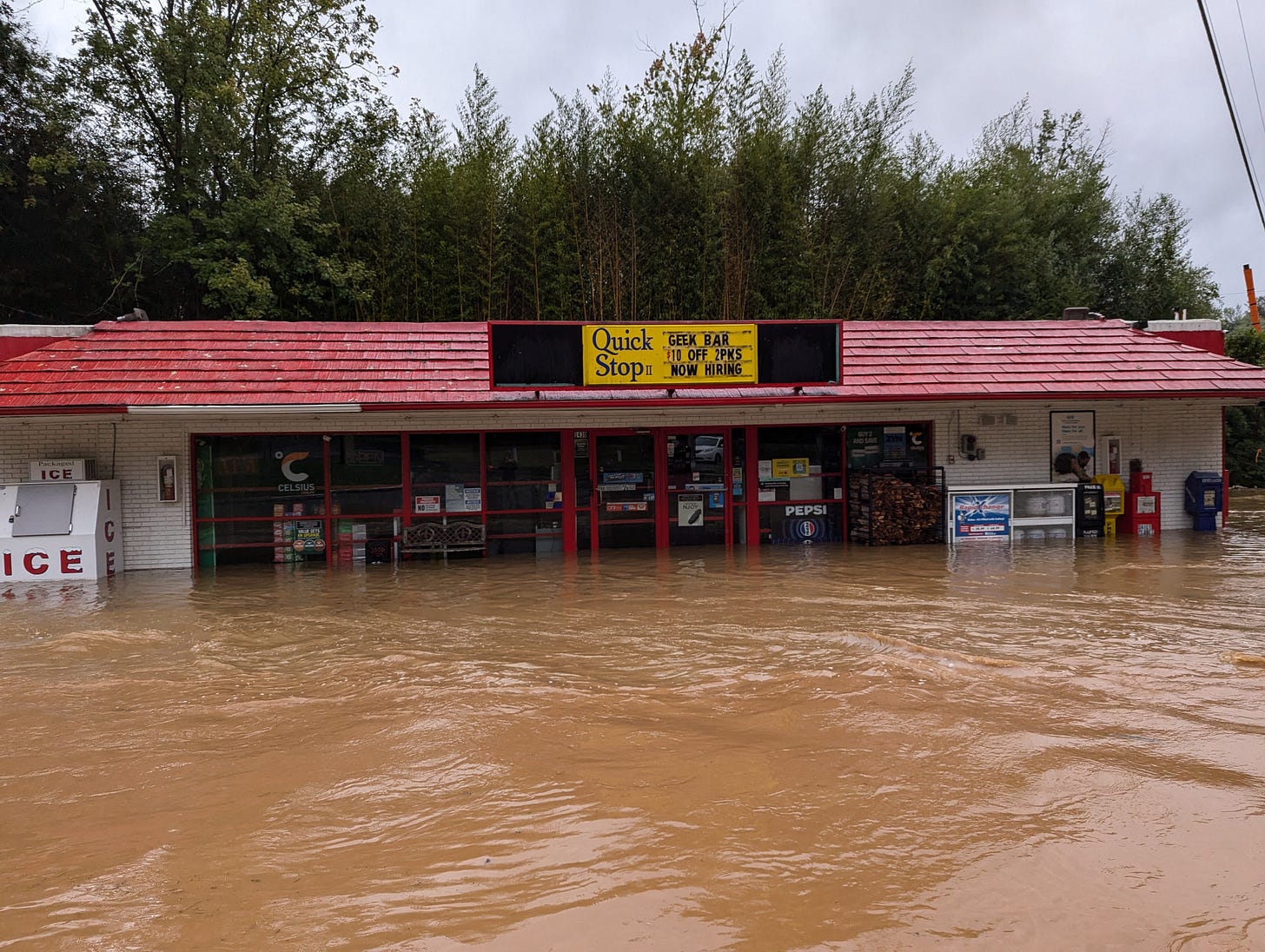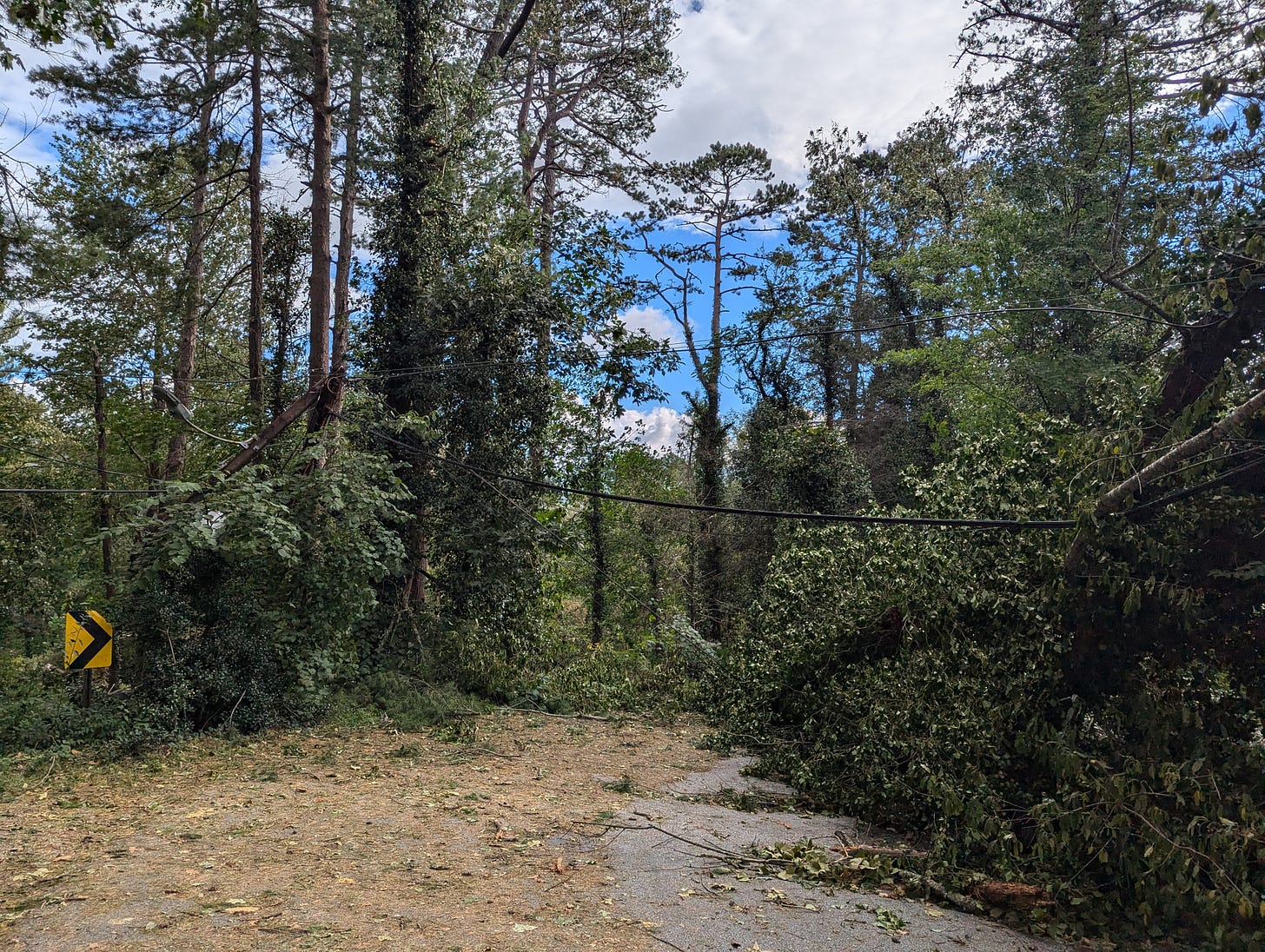My family and I left our home in Asheville. We didn't want to.
Our Helene experience and how you can help.
Six days ago, I scolded my youngest, as I lit the burner of our camp stove and prepared breakfast on cast-iron: scrambled eggs, pancakes, and bacon. “No, no, no. You can’t open the fridge.” My oldest subsequently dances into the kitchen, blissfully unaware of our dire situation, and opens the refrigerator door. I raise my voice, “I just told your sister not to open the fridge. Didn’t you hear me? We can’t go in and out of the refrigerator. Okay? The power’s out, so we have to keep the door closed to keep the food as cold as possible for as long as possible. Don’t open the fridge door or the freezer door unless you ask Mama or Dada. Got it?”
As my words hit her, she began to wail. And, then I realized how none of this makes sense to either of my two small children, who have had modern conveniences their entire lives, which is only two years for one and four for the other. Tears began to well my eyes, cresting then releasing like the flood that has just wiped out beloved parts of my home city—Asheville, North Carolina—and its surrounding towns.
This command is just the beginning of many that I bark at my kids over the next three days:
“Don’t get too dirty—we can’t take a bath later.”
“Two hands! We can’t have any spills, right now.”
“Don’t flush the potty unless Mama or Dada is there to help. We only flush for poop—not for pee, right now.”
After laying out all the weird rules, we started to find our rhythm and routine as a family without power, running water, and limited cell service. And though Helene has completely upended and literally uprooted our lives, she has not defeated us, the lucky ones, the ones who have survived.
Instead of screen time during the morning hustle to get out the door for school or while I make dinner, my children have adapted: pretending to camp out with their battery-powered kid lanterns, “re-building Asheville” with wooden blocks, and creating artwork that reflects Helene’s destruction: fallen trees, fallen branches, fallen leaves, lit candles in houses, and hoses coming out of basements in an effort to drain the water that has flooded them.
They’ve watched us, their parents, surveying our neighborhood, discussing with anyone and everyone on our street, and helping our neighbors 24/7 since last Friday. Alongside us, they’ve delivered supplies, dinner, and water via their Radio Flyer wagon to our community—friends who have now become family. They’ve also received toys, lunch, sweet treats, and water from these same lovely folks. Our little half-mile radius of Western North Carolina has become its own ecosystem, benefitting and supporting one another. It has been both heartbreaking and heartwarming to see.
Our girls are still processing, just as we are, reeling after believing all had weathered the storm just fine, like us—not knowing how others had not weathered the storm but instead got weathered: their homes wiped out, their businesses blasted, and their communities dismantled.
Today, nearly a week later, the death toll still climbs. As of 7:34 a.m., according to the Citizen Times: “Deaths caused by the hurricane nationwide surpassed 160 people, making Helene the second deadliest hurricane in the U.S. this century. That number is surpassed only by Katrina in 2005, which killed 1,392 people.” 61 of the 73 confirmed deaths in North Carolina are from Buncombe County alone—my county—and that number continues to increase with each passing hour, as relief workers continue their search by land and sky.
Three days ago, two friends of friends of friends delivered gas to our front doorstep. One of my best friends put out a call on social media to help us acquire gas in order to get out of Asheville as a way for us to bathe, communicate with family and friends, and regroup.
Between the two gas cans, we were able to fill our van’s gas tank, which was enough for us to confidently make it to Charlotte. I cried when we got to a gas station that had gas and no long lines. I cried when I had a strong, consistent signal and could call and respond to all the texts that I had missed. I cried when I saw the images and videos of our area—places that we frequented, places that we made memories, places that we treasured: demolished.
And, though the grief is just starting to hit us now, it builds and swells and disperses to varying degrees. I’m starting to grieve the little things like the camping trip that will no longer happen in two weeks in one of our favorite places: Montreat, North Carolina. And, I’m starting to grieve the big things: the businesses who rely on this time of year’s influx of “leaf peepers” when the mountains turn all shades of gold, orange, yellow, red, and brown and call for cooler temperatures, apple picking, bonfires, pumpkin-spiced foods and beverages, and hayrides. I’m starting to grieve for the folks who, like me, had grand autumn plans and are now stranded, missing, or dead.
Nearly a week ago, on the day that Helene came in like a bat out of hell and ravaged these mountains that hold our hearts, my family and I were supposed to travel to Boone, just 100 miles north of Asheville, for a college-friends’ reunion: a weekend of memory-makin’ in the “High Country.” We had planned a picnic at Moses Cone, maybe a stroll on the Greenway or through the Farmers Market, and of course, a walking tour of our old stomping grounds: Appalachian State University.
Instead, we decided to cancel the trip last Thursday after reading the disconcerting forecast from trusted local meteorologist, Ray Russell. It wasn’t until 10:18 p.m. that night that my husband and I were notified from the Buncombe County Emergency System: “Anyone in the French Broad and Swannanoa River Valleys/Tributaries should self-evacuate before anticipated crests overnight Friday and into Saturday morning.” The message then directed evacuees to a small number of shelters that were immediately available.
What many from the outside are now starting to understand is that this warning was too late; the people who live near these rivers, deep in hollers, or on tops of mountains were not given adequate time to evacuate. The country roads that take our people home every day quickly became impassable, broken, and/or gone.
The road to recovery is going to take weeks, months—years. With your help and the help of other good people, Asheville will rebuild. However, I fear that the smaller, surrounding communities will not be as fortunate: Swannanoa, Black Mountain, Montreat, Fairview, Chimney Rock, Lake Lure, Hot Springs, Marshall, Banner Elk, Linville, Spruce Pine—the list goes on.
Misty-eyed, I sit in bed and type here and ask for your help.
If you are able to volunteer and/or donate to any of the organizations provided in the links below, please do. I’m sure many of you remember Katrina (unfortunately, my namesake) and the damage she walloped. Helene, so far, is her close, younger sister, and she “sure was somethun’ else” as we’d say here in the South.
Thank you from the bottom of my heart for your time, your funds, your kindness and compassion.
–-Katrina
***
Blue Ridge Public Radio’s “List: Ways to donate and help flood victims in Western North Carolina after Hurricane Helene”
My friend and award-winning journalist Lindsay Tigar’s “How to Help My Home: Asheville Hurricane Relief”
The one and only Alex Dobrenko’s “we’re okay - a quick Asheville update”
Thank y’all so much for being here! If you liked what you read, please tap that little heart below, leave a comment, re-stack this post, and/or consider upgrading your subscription. Your participation and support motivate me to keep doing the thing!










I’m in Raleigh, but some of my friends went to App State. It’s a hard pill to swallow and I admire your courage. Sending prayers and positive vibes to you all. That rainbow shows that God has you all💕
Asheville is also my hometown, though I now live in Tallahassee. We were in Boone when this all started. It's been heartbreaking to see the 600 miles of devastation Helene caused. I'm so glad you and your family are safe. Thank you for sharing your story and the links to help.